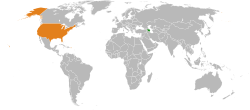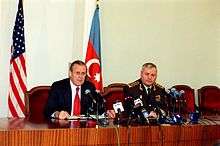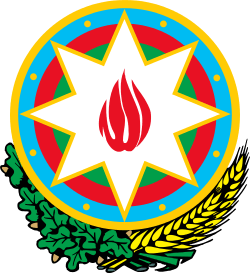Azerbaijan–United States relations
 |
|
Azerbaijan |
United States |
|---|---|
The United States and Azerbaijan have had diplomatic relations since 1994.[1]
According to the 2012 U.S. Global Leadership Report, 53% of Azerbaijanis approve of U.S. leadership, with 27% disapproving and 21% uncertain.[2]
History
A first encounter of the United States-Azerbaijani inter-state relations was the meeting between President of the United States Woodrow Wilson and the delegation of Azerbaijan Democratic Republic to the 1919 Paris Peace Conference. Azerbaijani delegates were unimpressed by the meeting in Paris, as instead of recognition, President Wilson advised them to develop a confederation with Transcaucasian neighbors on the basis of a mandate granted by the League of Nations. The Azerbaijani question, Wilson concluded, could not be solved prior to the general settlement of the Russian question.[3] But recalling this meeting in his speech at the Commonwealth Club of California in San Francisco on September 18, 1919, Wilson outlined his positive impression of Azerbaijani delegation:
Do you know where Azerbaijan is? Well, one day there came in a very dignified and interesting group of gentlemen who were from Azerbaijan. I didn't have time, until they were gone, to find out where they came from. But I did find this out immediately: that I was talking to men who talked the same language that I did in respect of ideas, in respect of conceptions of liberty, in respect of conceptions of right and justice.[4][5]
Upon the Bolshevik occupation in April 1920, Azerbaijan SSR was proclaimed, which in 1922 joined Soviet Union as a part of Transcaucasian Federative Soviet Socialist Republic. No direct inter-state relations existed between Azerbaijan SSR and the United States.
Contemporary relations
On October 18, 1991, the Azerbaijani parliament adopted a declaration of independence. Subsequently, on December 25, 1991, Soviet Union ceased its existence and the United States formally recognized 12 former Soviet republics, including Azerbaijan, as independent states.[6] On March 6, 1992, Azerbaijan opened its embassy in Washington, and on March 16, 1992, the United States opened its embassy in Baku, the capital of Azerbaijan[7][8]
In 2005, as a freshman Senator, Barack Obama visited Azerbaijan on a working trip together with a senior U.S. Senator Richard Lugar.[9]
Speaking at a conference on U.S.-Azerbaijani relations at Georgetown University in September 2009, the Under Secretary of State for Political Affairs William J. Burns outlined three main areas of interest for the United States in its bilateral relations with Azerbaijan: security cooperation, energy, and economic and democratic reform.[10]
Nagorno-Karabakh conflict
Modern US-Azerbaijani relations have been strongly influenced by the US official position on the Nagorno-Karabakh conflict between Armenia and Azerbaijan. The US was actively involved in the attempts to resolve the conflict since 1992. As a part of the Conference on Security and Cooperation in Europe (CSCE; now OSCE) mission, US Secretary of State James Baker III proposed a set of rules named after him, which eventually defined the representation of the conflicting sides within the OSCE Minsk Group negotiation format.[11]
In 1992, the U.S. Congress adopted Section 907 of the Freedom Support Act, which banned any direct US aid to the government of Azerbaijan. The ban made Azerbaijan the only exception to the Post-Soviet states receiving US government aid for facilitating economic and political stability.[12] Passage of Section 907 was influenced by the powerful Armenian American lobby in the U.S. Congress,[13] in response to the blockade imposed by Azerbaijan on Armenia in the course of the Nagorno-Karabakh War. Azerbaijanis consider this legislation to be unfair as, during the same period of time, Armenian forces took control of the fifth of Azerbaijani territory, including Nagorno-Karabakh.[14] Consecutive George H.W. Bush, Clinton and George W. Bush administrations opposed Section 907,[15] viewing it as an impediment to impartial US foreign policy in the region and an obstacle to the US role in the Nagorno-Karabakh conflict mediation efforts.[11] In her 1998 letter to the House Appropriations Committee chairman, Bob Livingston, then US Secretary of State Madeleine Albright wrote:
Section 907 damages US national interests by undermining the administration's neutrality in promoting a settlement in Nagorno-Karabakh, its ability to encourage economic and broad legal reforms in Azerbaijan, and efforts to advance an East-West energy transport corridor.[16]
After the September 11 attacks in 2001, Congress passed the foreign appropriations legislation of 2002, granting President the right to waive Section 907.[17] In view of Azerbaijan's contribution and support for the US military operations in Afghanistan,[18] President George W. Bush waived the section in January 2002;[19] and President Barack Obama further extended that waiver.
Security partnership

The US-Azerbaijani security relations developed along several paths, including Azerbaijan's active participation in the NATO's Partnership for Peace program and the US-led missions in Kosovo, Afghanistan and Iraq;[20] and the bilateral military ties to ensure Caspian energy and transportation security. In support of the US-led War on Terror, apart from troop contributions, Azerbaijan provided overflight, refueling, and landing rights for U.S. and coalition aircraft bound for Afghanistan and Iraq; shared information to combat terrorism financing; detained and prosecuted suspected terrorists.[10] Apart from usage of Azerbaijani airspace by US air force, over one-third of all of the nonlethal equipment including fuel, clothing, and food used by the US military in Afghanistan travels through Baku.[21] In November 2011, the United States Secretary of the Navy Ray Mabus met with the Azerbaijani President and Defense Minister announcing the military ties between their countries would expand. The US State Department already offered Azerbaijan $10 mln to enhance its security structures in the Caspian Sea earlier that year.[22]
Economic cooperation
_-_01.jpg)
U.S.–Azerbaijani ties in economic sphere developed primarily in the context of Caspian energy resources and their transportation to Western markets. The U.S. companies are actively involved in the development of Caspian hydrocarbons in offshore Azerbaijani oilfields, and the U.S. government actively supported the Baku–Tbilisi–Ceyhan pipeline as the primary route of transportation for Caspian oil.[23]
In January 2008, commenting on a trip to Azerbaijan by Sen. Richard Lugar, R-Ind., head of the Senate Foreign Relations Committee, John C.K. Daily of UPI called Azerbaijan "the one remaining friend that America has in the Caspian basin".[24] During this visit Sen. Lugar also suggested that he along with fellow Senate Foreign Relations Committee member Joseph Biden, D-Del., endorsed the need for "a special representative focused on energy issues in the Caspian to safeguard long-term U.S. interests" in a letter they sent earlier to Secretary of State Condoleezza Rice.[24]
The United States has signed a bilateral trade agreement with Azerbaijan, granting it the status of a "most favored nation", in 1995; and a bilateral investment treaty with Azerbaijan, naming it a beneficiary country under the Generalized System of Preferences (GSP) program, in 2008[8] The U.S. also supports Azerbaijan's application for accession to the World Trade Organization.[10]
See also
References
- ↑ Bulletin d'Information de l'Azerbaidjan, No. I, September 1, 1919, pp. 6–7
- ↑ U.S. Global Leadership Project Report - 2012 Gallup
- ↑ Report of the Delegation, No. 7, June, 1919, Fund of the Ministry of Foreign Affairs, Dossier No. 3, p. 7, as cited in Raevskii, Английская интервенция и Мусаватское правительство, p. 53
- ↑ Saum, Steven Boyd (2004) [Sep 18, 1919]. "Woodrow Wilson: The Peace Treaty and the Covenant of the League of Nations". Each a mighty voice: a century of speeches from the Commonwealth Club of California. Heyday. p. 21. ISBN 978-1-890771-87-4.
- ↑ The Commonwealth Club of California (1920) [Sep 1919]. "Address by President Wilson". Transactions. 14. San Francisco. p. 376.
- ↑ James P. Nichol. Diplomacy in the Former Soviet Republics, Praeger/Greenwood, 1995, ISBN 0-275-95192-8, p. 150
- ↑ Betty Blair (1993). "Azerbaijan International: Regional Stability and US Interests". 1–2. Azerbaijan International.
- 1 2 "U.S. Department of State. U.S.-Azerbaijan relations". Archived from the original on 8 July 2010. Retrieved 2010-07-08.
- ↑ Larson, Christina (Sep 2006). "Hoosier Daddy". Washington Monthly.
- 1 2 3 Burns, William J. (Sep 18, 2009). "Remarks: U.S.-Azerbaijan Relations". Georgetown University: Department of State.
- 1 2 Maresca, John J. (2000). "The conflict over Nagorno-Karabakh". In Jentleson, Bruce W. Opportunities missed, opportunities seized: preventive diplomacy in the post-Cold War world. Rowman & Littlefield. pp. 78–80. ISBN 978-0-8476-8559-2.
To make early negotiations possible, the United States also brokered an agreement under which both the Armenian and the Azerbaijani communities of Nagorno-Karabakh would participate separately in the Minsk Group, though not as sovereign states.
- ↑ U.S. Public Law No: 102-511
- ↑ Croissant, Michael; Aras, Bülent (1999). Oil and geopolitics in the Caspian Sea Region. Greenwood Publishing Group. p. 243. ISBN 978-0-275-96395-8.
It was passed by the US Congress at the insistence of a powerful Armenian lobby
- ↑ U.S. Denies Aid to Azerbaijan
- ↑ "Oil and Turmoil in the Caucasus". Washington Post. Jul 19, 1997.
Section 907 was enacted over the opposition of the Bush administration and now is opposed by the Clinton administration
- ↑ Cornell, Svante E. (2001). Small nations and great powers: a study of ethnopolitical conflict in the Caucasus. Psychology Press. p. 376. ISBN 978-0-7007-1162-8.
- ↑ 107th U.S. Congress (Jan 10, 2002). "Foreign Operations, Export Financing, and Related Programs Appropriations Act, 2002". Public Law 107-115.
- ↑ Cornell, Svante E. (2010). Azerbaijan Since Independence. M.E.Sharpe. p. 410. ISBN 978-0-7656-3003-2.
- ↑ Chouldjian, Elizabeth S. (Jan 25, 2002). "President Bush waives Section 907". Press Release. Armenian National Committee of America.
- ↑ Nichol, Jim (Apr 9, 2009). "Armenia, Azerbaijan, Georgia: Political developments and implications for US interests". CRS Report for Congress. Congressional Research Service. p. 2.
- ↑ Richard Solash (2011-12-29). "U.S. Ambassador To Azerbaijan Leaving Post". Radio Free Europe/Radio Liberty. Retrieved 2012-01-05.
- ↑ "Azerbaijan, U.S. to Expand Military Ties". CRI English. 2011-11-22. Retrieved 2011-11-25.
- ↑ Bülent Gökay. The Politics of Caspian Oil, Palgrave Macmillan, 2001, ISBN 0-333-73973-6, p. 195
- 1 2 Daily, John C.K. (2008-01-18). "Analysis: U.S. has ally in Azerbaijan". United Press International. Archived from the original on 22 January 2008. Retrieved 2008-01-21.
External links
![]() Media related to Azerbaijan – United States relations at Wikimedia Commons
Media related to Azerbaijan – United States relations at Wikimedia Commons
.svg.png)
